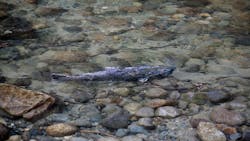Rain gardens could save fish from toxic tire chemicals
New research finds that specially-designed rain gardens could drastically reduce the amount of amount of a toxic chemical associated with tires entering waterways, according to a press release by the University of British Columbia (UBC).
The chemical 6PPD-quinone can form when car tires interact with the atmosphere. It enters rivers and streams from stormwater runoff. The chemical is toxic to many fish.
Rain gardens, or bioretention cells, could reduce the loading of 6PPD-quinone by more than 90%, according to the research published by the American Chemical Society.
Specially designed gardens could reduce the amount of a toxic chemical associated with tires entering our waterways by more than 90 per cent, new research shows.
In the City of Vancouver, UBC researchers Timothy Rodgers and Rachel Scholes tested a Vancouver rain garden, pumping 14,000 liters of water spiked with 6PPD-quinone onto the garden for four hours and testing the water draining from beneath the garden at frequent intervals. They found only about 2-5% of the chemical made it through, with about 75% captured by the soil and plants.
Extrapolating their results using a computer model, the team predicted the garden would prevent more than 90% of the chemical from directly entering salmon-bearing streams in an average year.
Vancouver’s Rain City Strategy will build more green infrastructure, including rain gardens, and municipalities could use the research to plan where and how to place these, the researchers say. This could include targeting areas with large highways that runoff into salmon-bearing streams and such systems could help meet multiple municipal environmental goals simultaneously.
